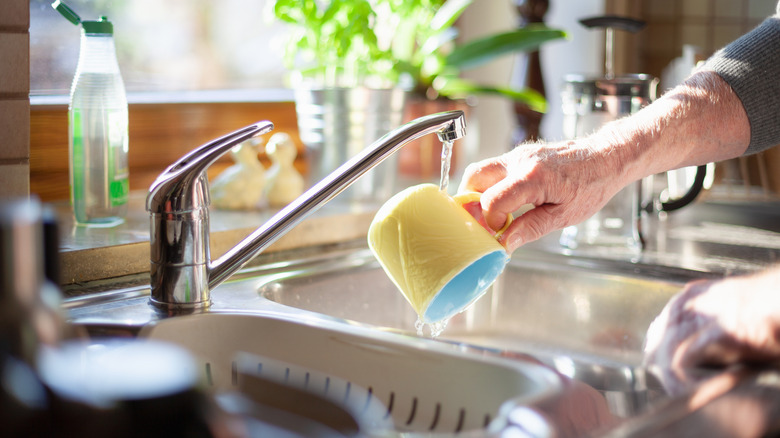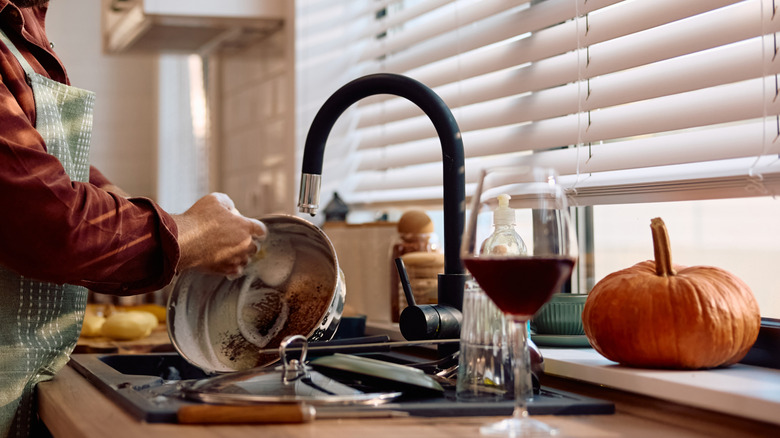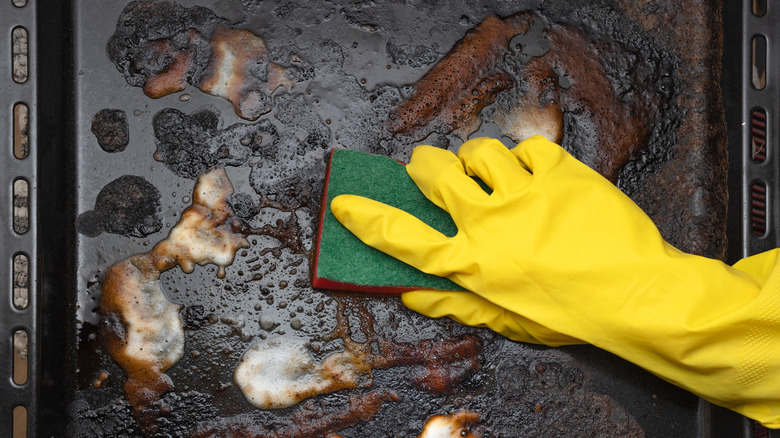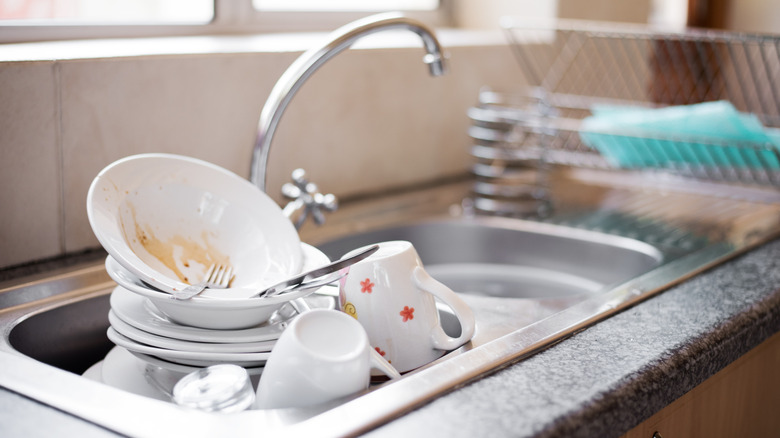3 Cleaning Strategies To Make Washing The Dishes More Efficient And Less Miserable
Washing dishes can feel like a never-ending chore. The second you finally clear out your sink, you're bound to end up with additional pots, pans, plates, and cups from your next meal just a few hours later. It's a common annoyance, even if you're living by yourself, but it can start to feel genuinely overwhelming if you're a frequent cook or have a large family. If this is how you feel, you're not alone. According to a YouGov poll, 14% of respondents cited doing the dishes as their most dreaded chore, tying it for the top spot alongside doing laundry and cleaning the bathroom.
Thankfully, however, there are ways to minimize this stress and make your cleaning routine more efficient. Whether you're looking for a strategy that will help to cut down the amount of time you spend doing dishes, a way to reduce the amount of pain-staking scrubbing you have to do, or a method that will ensure you get a break without falling behind, there are plenty of tips and tricks to help you out. Cleaning as you go, washing dishes in the correct order, and leaving dishes for the morning (with proper preparation, of course) can help make the whole process less frustrating and ensure you have more time to spend actually enjoying the delicious meals you make.
Clean as you go
One of the biggest mistakes everyone makes when doing the dishes is not cleaning as they go. We get it — cooking can be stressful. If you're preparing an elaborate meal that needs to be watched like a hawk, it's probably not the best idea to step away to scrub a pan, but with most dishes, you have plenty of downtime. While your vegetables are roasting or your meat is searing, go ahead and wash the tools and surfaces you used for prep. Right after plating, while you're still waiting for your meal to slightly cool down before you eat, scrub down your pan before the food has a chance to fully cool and stick.
This might seem like it will just make your time in the kitchen more complicated and extend the process of dishwashing, but getting into the habit of washing a dish when you have a few free minutes will prevent the inevitable pile-up after cooking. If you have someone helping you out with the meal, even better — have them set up shop by the sink or dishwasher to receive items after you're done using them. By the time your meal is done cooking, your kitchen will be almost completely clean again, giving you the chance to actually sit back and relax while enjoying your dinner instead of having to get right back to working the second you're done eating.
Save the greasiest dishes for the last part of your wash
As it turns out, the order you wash dishes will make all the difference in getting food messes clean. Instead of starting out with the large, greasy pots and pans, it's best to save them for last. You may already be unintentionally doing this — we've all been guilty of getting the easy dishes out of the way first in an attempt to put off scrubbing that massive stockpot on the stove — but now, you officially have a reason.
This advice should be followed regardless of whether you prefer to fill your sink completely with water while scrubbing or if you simply keep the faucet running and rinse as you go. If you fill the sink, cleaning less dirty items first will ensure your water stays debris-free for longer and give your more soiled items some time to soak. If you keep the faucet going, clearing out the smaller, more delicate items first will also provide you with more space to clean without worrying about breaking something.
The exact order will depend on what items you're working with and how dirty they are, but as a general rule, you'll want to start out with silverware and glassware. From there, get to work on your plates and any serving dishes, and then finish off with pots, pans, and baking sheets once they've had a bit of time to soak. Give your sink a quick scrub with your still-sudsy sponge or brush, making sure to rinse away any leftover food bits, and you're good to go.
Stop stressing and leave them overnight
Sure, completely resetting your kitchen at the end of the day is ideal, but this isn't always possible. Whether you're too busy caring for your kids, completing other nighttime chores, or simply exhausted from a long day at work, leaving your dishes in the sink for tomorrow isn't a big deal. Staying up late or cutting into your relaxation time in order to ensure your house looks impeccable at the end of the day might actually end up doing more harm than good. If you wake up feeling tired and overwhelmed, you're less likely to stay on track with your other responsibilities.
Instead, do a bit of prep to set yourself up for success once you do have time to clean. Scrape off leftover food from your dishes as soon as you're done eating, before they even have the chance to make it to the sink. If you have kids, it can also be beneficial to teach this as an individual habit or make it the responsibility of the person clearing the table. This will help to prevent stuck-on messes, get rid of any food debris that could end up clogging your drain, and eliminate the risk of attracting fruit flies. If you have any large or particularly dirty dishes, like pots and pans with greasy residue, add a small squirt of dish soap and fill them up with water to soak overnight. By the time you're ready to clean, the dishes will have had plenty of time to soak, making it much easier to scrub away debris.



